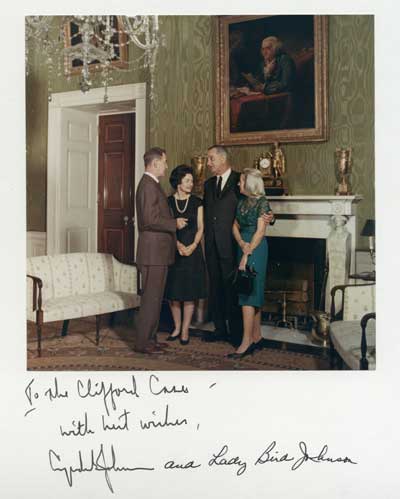President Harry S Truman addressed Congress on March 12, 1947 regarding the spread of communism into Greece and Turkey, and in his speech he said "I believe that it must be the policy of the United States to support free peoples who are resisting attempted subjugation by armed minorities or by outside pressures." Senator Case was always in agreement with the sentiments that became known as the Truman Doctrine. The Truman Doctrine guided U.S. foreign policy during the Cold War and facilitated the development of the Marshall Plan and was reinforced by the containment of communism.
Understanding this it comes as no surprise that the Senate voted 88-2 in favor of the Tonkin Gulf Resolution, and that Senator Case was one of the "yea" votes.
Read through the Tonkin Gulf Resolution passed by Congress on August 10, 1964 and prepare brief talking points to the discussion questions which follow.
- What powers are given to the president by the Tonkin Gulf Resolution?
- Construct a two-columned table with the headings 'Formal Powers' and 'Inherent Powers,' and place the powers identified in Question #1 into those two categories.
- Citing specific examples from the Tonkin Gulf Resolution, what language in it reflects American Cold War foreign policy? How do you know?
- What are the potential ramifications of granting the president this power?
- Why do you believe that Senator Case voted "yea" for this bill? Please provide at least 2 reasons to justify your response.

Autographed Photograph of President Johnson and Lady Bird w/ Clifford and Ruth Case from the Ruth Case Files, 1965
Link to Document
- Tonkin Gulf Resolution. View now or open the PDF version (0.1MB)
Activity II — Senator Case is Goin' with the Flow
- Provide students with the materials for this activity if they do not have access to Electronic New Jersey.
- In order to complete the questions associated with the Tonkin Gulf Resolution, students either need to complete the Introductory Activity for the module or be instructed on the differences between formal and inherent powers.
- To complete the activities in this unit students must be familiar with the Cold War foreign policy of the United States and understand why the United States became militarily involved in the post-World War II conflicts in Indochina, including the conflict that would become the Vietnam War.
- Direct students to the "Senator Case is Goin' with the Flow" section of Electronic New Jersey. Once there they will see this brief statement which they are to read.
President Harry S Truman addressed Congress on March 12, 1947 regarding the spread of communism into Greece and Turkey, and in his speech he said "I believe that it must be the policy of the United States to support free peoples who are resisting attempted subjugation by armed minorities or by outside pressures." Senator Case was always in agreement with the sentiments what became known as the Truman Doctrine. The Truman Doctrine guided U.S. foreign policy during the Cold War and facilitated the development of the Marshall Plan and was reinforced by the containment of communism.
Understanding this it comes as no surprise that the Senate voted 88-2 in favor of the Tonkin Gulf Resolution, and that Senator Case was one of the "yea" votes.
- Students are to read through the Tonkin Gulf Resolution and in small groups prepare answers to the following document analysis. They also need a copy of the United States Constitution and any materials from their Introductory Activity.
- What powers, formal and inherent, are expressly given to the President of the United States through this law?
- What language reflects American post-war period foreign policy? How do you know?
- What are the potential ramifications of granting the president this power?
- Why do you believe that Senator Case voted "yea" for this bill? Please provide at least 2 reasons to justify your response.